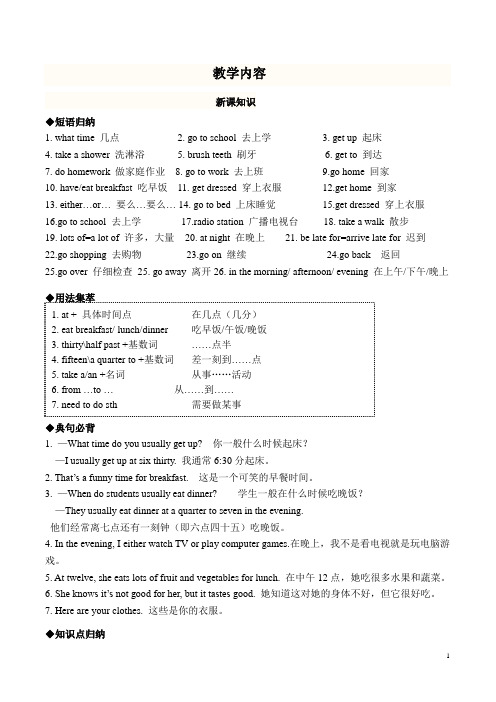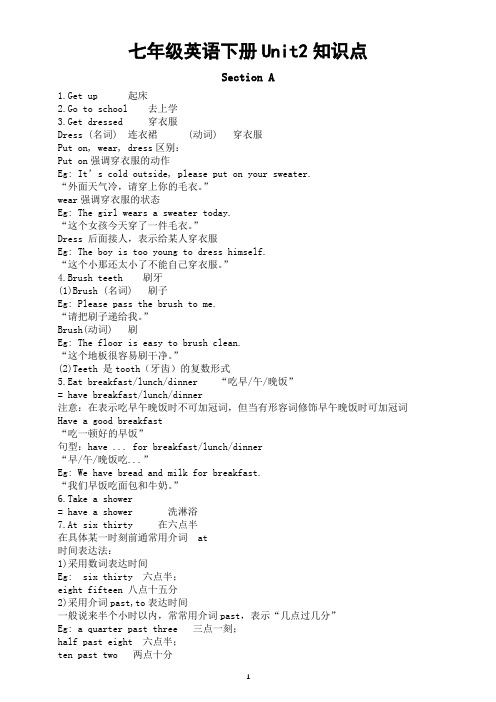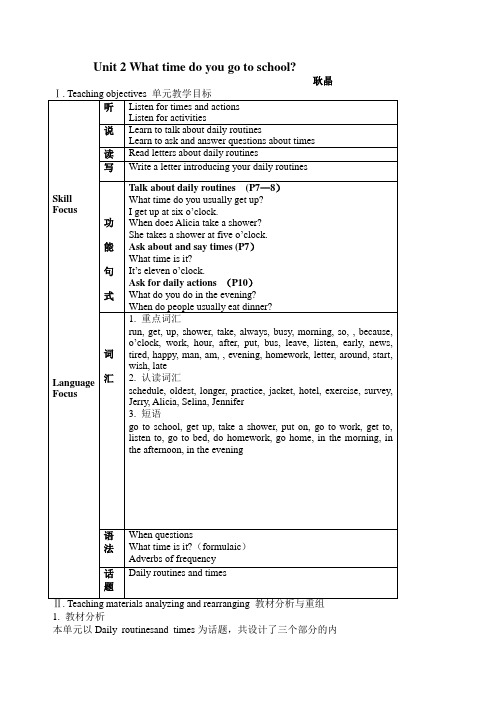2013年春新版七年级下Unit2_What_time_do_you_go_to_school1-3课时课件
七年级英语下册_Unit2_what_time_do_you_go_to_school知识点__练习和答案

教学内容新课知识◆短语归纳1. what time 几点2. go to school 去上学3. get up 起床4. take a shower 洗淋浴5. brush teeth 刷牙6. get to 到达7. do homework 做家庭作业8. go to work 去上班9.go home 回家10. have/eat breakfast 吃早饭11. get dressed 穿上衣服12.get home 到家13. either…or… 要么…要么… 14. go to bed 上床睡觉15.get dressed 穿上衣服16.go to school 去上学17.radio station 广播电视台18. take a walk 散步19. lots of=a lot of 许多,大量20. at night 在晚上21. be late for=arrive late for 迟到22.go shopping 去购物23.go on 继续24.go back 返回25.go over 仔细检查25. go away 离开26. in the morning/ afternoon/ evening 在上午/下午/晚上◆用法集萃1. at + 具体时间点在几点(几分)2. eat breakfast/ lunch/dinner 吃早饭/午饭/晚饭3. thirty\half past +基数词……点半4. fifteen\a quarter to +基数词差一刻到……点5. take a/an +名词从事……活动6. from …to … 从……到……7. need to do sth 需要做某事◆典句必背1. —What time do you usually get up? 你一般什么时候起床?—I usually get up at six thirty. 我通常6:30分起床。
初中英语人教版七年级下Unit 2 What time do you go to school知识点

七年级英语下册Unit2知识点Section A1.Get up 起床2.Go to school 去上学3.Get dressed 穿衣服Dress (名词) 连衣裙 (动词) 穿衣服Put on, wear, dress区别:Put on强调穿衣服的动作Eg: It’s cold outside, please put on your sweater.“外面天气冷,请穿上你的毛衣。
”wear强调穿衣服的状态Eg: The girl wears a sweater today.“这个女孩今天穿了一件毛衣。
”Dress 后面接人,表示给某人穿衣服Eg: The boy is too young to dress himself.“这个小那还太小了不能自己穿衣服。
”4.Brush teeth 刷牙(1)Brush (名词) 刷子Eg: Please pass the brush to me.“请把刷子递给我。
”Brush(动词) 刷Eg: The floor is easy to brush clean.“这个地板很容易刷干净。
”(2)Teeth 是tooth(牙齿)的复数形式5.Eat breakfast/lunch/dinner “吃早/午/晚饭”= have breakfast/lunch/dinner注意:在表示吃早午晚饭时不可加冠词,但当有形容词修饰早午晚饭时可加冠词Have a good breakfast“吃一顿好的早饭”句型:have ... for breakfast/lunch/dinner“早/午/晚饭吃...”Eg: We have bread and milk for breakfast.“我们早饭吃面包和牛奶。
”6.Take a shower= have a shower 洗淋浴7.At six thirty 在六点半在具体某一时刻前通常用介词 at时间表达法:1)采用数词表达时间Eg: six thirty 六点半;eight fifteen 八点十五分2)采用介词past,to表达时间一般说来半个小时以内,常常用介词past,表示“几点过几分”Eg: a quarter past three 三点一刻;half past eight 六点半;ten past two 两点十分半小时过后多用介词to,表示“差几分到几点”Eg: a quarter to three 两点四十五;twenty to four 三点四十3)a. m. 和p. m.A.m. 表示“午前;上午”(午夜12:00后至中午12:00前);p.m. 表示“午后;下午”(中午12:00后至午夜12:00前)。
Unit2_What_time_do_you_go_to_schoo练习题

Unit 2 What time do you go to school?短语Ⅰ.Match the word or phrase with the proper Chinese meaning.(把单词或词组与它的汉语意思连起来。
) 1.go to school A.在早晨 2.take a shower B.做作业 3.brush one’s teeth C.起床 4.in the morning D.刷牙 5.do one’s homewo rk E.去上 6.listen to F.去上学 7.get to G.听…… 8.get up H.到达 9.at night I.洗澡 10.go to work J.在夜里 Ⅱ.Complete the sentence with do, don’t, does or doesn’t .(用do, don’t, does, doesn’t 完成句子。
) 1.— your brother like comedies? —Yes,he . 2.— she often watch morning news? —No,she . 3.— you sleep late(晚)on weekends?—Yes,I . 4.— the students love the music? —No,they . 5.—What club you want to join? —A basketball club.6.I not like thrillers because they are scary. III. Exercises for new words (生词专练)) 1.The old man to the radio every evening. 2.I go to school at 8 o’clock in the morning. 3.My brother find a new in the city.Now he works in a factory(工厂). 4.You should(应当)brush your before breakfast. 5.We often work eighta day. 6.He school at 8:30 a.m.and school starts at 9:00 o’clock. 7.The last day of a week is . 8.Jim is my friend.He is American.We often to each other. IV. Exercises for phrases (短语专练)Look at the picture and write down the activity.(看图画,写出活动名称。
英语七年级下册语法Unit2What-time-do-you-go-to-school

Unit 2 What time do you go to school ? 一.What time 什么时候,几点钟。
常用于对具体的(确切的)时间提问,也可用when来替换,但反之不一定行。
1. What time/ When do you get up in the morning?I get up at six o’clock in the morning.2. What time is it ? / What’s the time ?It’s six-thirty. / It’s half past six.二.★关于时间的表达法:顺读法,逆读法。
1. 顺读法:按汉语的习惯,先说点后说分的方法。
结构:点+分。
5:10 five-ten 8:30 eight-thirty9:46 nine forty-six 1:05 one-five整点的读法:基数词+o’clock7:00 seven o’clock 12:00 twelve o’clock2. 逆读法:借助介词past或to, 先说分后说点的方法,其结构为:分+past/to +点past 过to 差①当分钟数小于或等于30分钟时,用介词past表示。
7:05 five past seven 6:30 thirty past six =half past six30 thirty=half an hour 11:25②当分钟数大于30时,用介词to表示:几点差几分。
其结构为:(60-分)+to +(点+1)11:50 ten to twelve 9:45 fifteen to ten =a quarter to ten7:55 3:35hour 小时minute 分second 秒quarter 一刻钟写出同义句:seven thirty = ____ ____ seven eight forty = ____ ______ nine 三.★感叹句What a funny time to eat breakfast !What a lucky guy!定义:表示喜怒哀乐等强烈感情的句子叫感叹句。
七下Unit_2_What_time_do_you_go_to_school

3a
Write answers or questions. Use always, usually or never.
1.What time do you get up on school days?
I usually get up at 5:30 on school days. _______________________________
6:30
2a
Listen to the conversation and complete the sentences.
two two Jim has _____brothers and ____sisters. Jim’s only shower. family has ________ one
What time is it
2. I eat dinner at 6:30. (对划线部分提问)
What time do you eat dinner _____________________________?
3.I usually go to bed at nine o’clock.(对划线部分提 问)
eat breakfast
6:20
What time do you usually eat breakfast?
I usually eat breakfast at 6:20.
play basketball
What time do you usually play basketball?
I usually play basketball at 7:00.
I always get up at 6:20. I never eat breakfast. I usually get up at 5:30 o’clock.
七年级新目标下Unit_2_What_time_do_you_go_to_school教案

Unit 2 What time do you go to school?耿晶1. 教材分析本单元以Daily routinesand times为话题,共设计了三个部分的内容。
旨在通过单元教学使学生学会谈论日常行为、询问并答复有关时间的问题、询问并回答人们在特定时间所从事的活动。
Section A 学习谈论日常作息时间。
1a, 1b, 1c 重点学习和学生息息相关的几种日常行为的英文表示方法,学会询问和答复日常作息时间。
2a, 2b, 2c ,2d继续学习谈论自己或他人的日常作息时间。
重点学习如何询问,这也是本单元的语法重点。
3a, 3b, 3c 学会叙述他人的日常活动安排,同时学习询问时间和时间表达法,进一步巩固询问别人的日常作息时间的表达法。
Section B 继续学习询问和谈论别人的日常行为。
1a, 1b, 2a, 1c,1d,1e,学会谈论和询问一天内各个时间段的活动安排。
2a,2b,3a,3b学会通过两个人的对比介绍来判断并养成好的作息时间。
Self check 重点单词句型复习2. 课型设计与课时分配Period 1 Listening and speaking (I)(Section A: 1a, 1b, 1c)Period 2 Listening and speaking (II)(Section A:2a, 2b, 2c,2d)Period 3 Integrating skills(Section A:3a, 3b, 3cSection B: 1a, 1b,1c,1d,1e)Period 4 Reading and writing(Section B:2a, 2b, 2c,3a,3b)Period 5 Self checkⅢ. Teaching plans for each periodPeriod 1 Listening and speaking(Ⅰ) Target language目标语言1. Words && phrases生词和短语Up,get up,dress,get dressed,brush,tooth,shower,take a shower,usually,forty, what time,2. Key sentences重点句子When do people usually ...? People usually ...What time do you usually ...? I usually ...Ability goals能力目标Enable students to learn to talk about daily routines.Learning ability goals学能目标Help the students learn how to talk about daily routines.Teaching important / difficult points教学重难点How to talk about daily routines.Teaching aids教具准备A tape recorder and a model clock.Teaching procedures and ways教学过程与方式Step ⅠWarming upIn this procedure, motivate students to learn some words and phrases by singing the songs they’ve learned before.T: Good morning, everyone. (sing) “Good morning to you. Good morning to you. Good morning, dear children. Good morning to you.” This song is easy to learn. Who can sing it to us?Encourage students to sing the song.T: Well done. Thank you! We sing “Good morning to you” in the morning. Then what do we sing in the afternoon and in the evening? S: We sing Good afternoon to you in the afternoon and Good evening to you in the evening.T: That’s right. I know all of you are very good at singing. Does anyone want to sing Good afternoon to you or Good evening to you to us?Step ⅡTalking and reading (1a)In this procedure, ask students to finish the required task and learn some key phrases about daily actions.T: As we all know, time is very important and in English there is a famous saying "An hour in the morning is worth two in the evening." So what do you do in the morning?S1: I read English. S2: I do morning exercise.T: And what do you do in the afternoon and in the evening?S1: I play basketball in the afternoon. S2: I watch TV in the evening.T: I’m very glad to hear that. You use your time very well. And there’re many daily things we can do. Now let’s read these phrases in 1a and match these actions and the time of day.Step ⅢPracticeIn this procedure, students will learn how to talk about actions and the time of day.T: I know you’re very clever. Now I want you to tell if my statements are right or wrong. First, I usually eat dinner in the morning. S: Wrong.T: When do I usually eat dinner? S: In the evening.T: Second, she gets up at 19:00 in the morning. S: Wrong.T: What is the correct way of saying the sentence? S: She gets up at 7:00 in the morning.T: How clever you are! Now let’s read the conversation in groups and see which group reads better.Ask students to do pairwork.T: Please ask your partner when people usually do these things: do homework, eat dinner, eat breakfast and go to bed.(Write “When do people usually ...”on the blackboard)Sample dialogue:S1: When do people usually do homework?S2: People usually do homework in the afternoon.Interest the students in going on practicing the conversation using a new way of reading.T: Now let’s try a new way of reading. First I name one student to ask a question, and then ask all of you repeat this question together. After that, I name another student to answer this question, and all of you repeat the answer together.Sample dialogue:S1: When do people usually go to bed?S: When do people usually go to bed?S2: People usually go to bed in the evening.S: People usually go to bed in the evening.Step ⅣTalking about time (1c)In this procedure, students will learn how to ask about and say hour times and learn some key phrases about daily routines.T: Boys and girls, please listen to what I’m saying and guess what it is. 小小骏马不停蹄,日日夜夜不休息,蹄声哒哒似战鼓,提醒人们争朝夕。
初一下_unit_2__What_time_dou_you_go_to_school_____Section_B_...

In the evening does her homework, swims or takes a walk At nine thirty
2c Write down the unhealthy habits of each person. Then think of healthy activities for them.
1c Listen and circle the activities
quickly adv. 很快地 either adv. 或者;也(用在否定 词组后) either…or… 要么……要么……; 或者……或者…… lot pron. 大量;许多 lots of 大量;许多
sometimes adv. 有时;间或 taste v. 有……的味道;品尝 n. 味道;滋味 life n. (pl. lives)生活;生命
half
half past nine quarter a quarter to twelve
a quarter past seven A.M. in the morning
P.M. in the afternoon
do homework
go to bed
run
walk
take a walk
clean the room
1) be good for …表示“对……有益;
对……有好处”; be bad for…表示“对……有害; 对……有坏处”。
2) taste 意为“尝起来……”。是连系动 词,后面常跟形容词作表语。学法p13 苹果尝起来味道很好。 Apples taste good. 冰淇淋的味道尝起来很好吗?
Read 2b again and fill in the blanks.
七年级下册unit2-What-time-do-you-go-to-school-知识点讲解与练习

1.What time do you get up?释:这是一个由疑问词what time(几点)引导的特殊问句。
其结构:What time +助动词do/does +主语+动词原形,询问某人做某事的具体时间。
例如:what time do you begin class in the morning?你们早晨几点开课?注:What’s the time=What time is it?也是用来询问时间,意为“几点了”。
用it作答。
例如:What’s the time? It’s 7:30.几点了?七点半了。
2.I usually get up at five o’clock. 我通常在五点钟起床。
释:1)句中usually与often 一样都是频度副词,常用于动词be 之后,行为动词之前。
always意思是“总是”、“永远”,表示动作重复,状态继续,中间没有间断,通常用来修饰动词的一般时态。
例如:We always get up before six o'clock.我们总是六点前起床。
若修饰动词进行时,则有“老是”,“再三地”的意思,带有厌烦、不满、赞美等感情色彩。
例如:You are always coming late.你老是迟到。
(含有责备的意思)He is always thinking of others.他总是想着别人。
usually(75%)意为“通常”,着重表示已习惯的动作。
反义词为:unusually。
例如:They usually have four classes in the morning.他们上午通常上四节课。
They usually do some shopping on Sunday.他们通常星期天买东西。
often(50%)意为“时常”、“经常”,表示常常这样,但不总是这样,反义词为:seldom。
例如:She often helps her mother with her housework after school.放学后她常常帮助母亲做家务。
- 1、下载文档前请自行甄别文档内容的完整性,平台不提供额外的编辑、内容补充、找答案等附加服务。
- 2、"仅部分预览"的文档,不可在线预览部分如存在完整性等问题,可反馈申请退款(可完整预览的文档不适用该条件!)。
- 3、如文档侵犯您的权益,请联系客服反馈,我们会尽快为您处理(人工客服工作时间:9:00-18:30)。
7:00 p.m. seven o’clock in the afternoon
21:30 15:15 half past nine p.m. a quarter past three p.m.
gபைடு நூலகம்t up
get dressed
brush teeth
eat breakfast
go to school
Read the clock time as quickly as possible.
4:04 1:58
5:30
6:15
7:30
8:45
9:00
3:20
The differences between 12-hour clock time and 24-hour clock time: 7:00 a.m. seven o’clock in the morning
What time do you usually brush teeth? I usually brush teeth at ten past six.
What time does she usually eat breakfast?
She usually eats breakfast at seven o’clo
根据主语的数确定答语动作的形式。 结构:主语+ always/usually/never +动词短语 看答语的中的主语, 确定用什么人称来询问。 根据答语的数确定问句中动作的形式。 结构: What time + do/does+ 主语+动词短语
1. What time do you get up on school days? I usually get up at seven o’clock. _______________________________ What time does Rick gets up 2. ______________________________? Rick always gets up at 6:20. 3. What time do you have breakfast? ___________________________________ I usually have breakfast at eight o’clock. 4. _______________________________? What time does Anna eat breakfast Anna never eats breakfast. 5. What time does your best friend go to school? She usually go to school at six forty. _______________________________
When do your friends exercise? They usually exercise on weekends.
二、探究乐园
1. 可以看出,询问做某事的时间时,可以 用__________和______ 两个疑问词来询 When What time 问。 2. 询问某人做某事的时间可以归纳为以下 句型: ________ What time + does + ____________ 主语 第三人称单数 + 动词短语?
4. _______________________________? Anna never eats breakfast. 5. What time does your best friend go to school? _________________________________
看问句的中的主语, 确定用什么人称回答。
What time does Rick eat breakfast? He eats breakfast at seven o’clock. When does Scott go to work? He always goes to work at eleven o’clock. He’s never late.
2a Listen to the conversation and complete the sentences.
Jim has two brothers and ___
two sisters. Jim’s family ___ has ___ shower. one
2b Listen again. Complete the shower schedule for Jim’s family.
3a Write answers or questions. Use always, usually or never. 1. What time do you get up on school days? _______________________________ 2. ______________________________? Rick always gets up at 6:20. 3. What time do you have breakfast? _______________________________
take a shower
run / exercise
have classes
do homework
go/get home
have lunch
go to bed
What time do you usually get up
I usually get up at 6 o’clock.
What time do you usually get dressed? I usually get dressed at twenty past six.
What time does she do her homework?
She does her homework at 7:00.
What time does he usually take a shower?
He usually takes a shower at half past six
What time does he usually go to bed?
What time is it?= What’s the time? It's....
two o’clock
What time is it?= What’s the time? It's....
half past nine
nine thirty
What time is it?= What’s the time? It's....
或_____+ does + _____________ 主语+ When 第三人称单数 动词短语? __________ + do + 非第三人称单数 主 _______________ What time 语 + 动词 短语? 或_______ + do + ______________ 主 When 非第三人称单数 语+动词短语? 3. 在答语中always, usually, never频率词 等放在主语与谓语动词之间。
what time does he usually run He usually runs at six ten.
What time do they usually go to school?
They usually go to school at seven fifteen.
a quarter past seven fifteen past seven
Time 8:00 a.m. 8:20 a.m. 8:30 a.m. 1:15 p.m. 7:00 p.m. 8:20 p.m. 9:30 p.m. 11:40 p.m. Activities gets up eats breakfast goes to work have (has) lunch goes home watches TV takes a shower goes to bed
He usually
goes to bed at ten o'clock.
you-get up-6:00 you-get dressed-6:10 you-brush teeth-6:30
you-exercise-7:00 you-go to school-7:30
he-runs-7:00 he goes to school-7:45 he-has classes-8:00 she-eats lunch-12:00 she-goes home-6:45
1b Listen and match the times with the actions. Draw lines from the clocks to the pictures.
six thirty 1. get up _______________
2. go to school ___________ seven thirty
Time
5:30 5:50 6:15 6:30 6:45
Name
Bob Mary Jack Jim Anna
Talk about Ms Gao’s Day
— What time does she usually get up? — She usually gets up at eight o’ clock am.
Unit 2
What time do you go to school?
What time is it?= What’s the time? It's....
nine o’clock
What time is it?= What’s the time?
